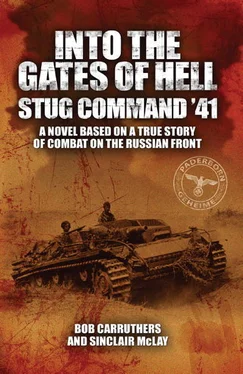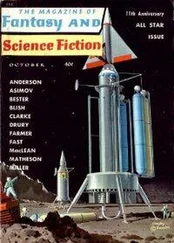“You have experience with the Soviets?” asked Schlieper. He was not happy with the idea of having to cooperate with these political soldiers, but one never knew who they were connected to, so he wisely allowed Voss the floor.
“Yes, I fought them in the last war for three years. I know Ivan. He is a master of camouflage, entrenchment, and defence construction. With great speed he disappears into the earth, digging in with unfailing instinct so as to utilize the terrain to make his fortifications very difficult to discover. When the Russian has dug himself into his native soil and has moulded himself into the terrain, he is a doubly dangerous opponent. The bombardment may just have created a new type of fortification.”
“Is there any tactical advice that you can offer, Sturmbannführer?” asked von Schroif.
“I could talk all day on the subject, but time is moving on. So I’ll just say that, as a soldier, the Russian is primitive and unassuming, innately brave but morosely passive when in a group. These traits make him in many respects a superior adversary to the self-confident and more demanding soldiers of other armies. In attack, the Russian fights to the death. Despite our most thorough defensive measures in the last war, he would continue to go forward, completely disregarding losses. He is generally not subject to panic. For example, in fortifications which had long since been bypassed and which for days lay far behind the front, they continued to fight, even when every hope of relief had vanished. Often, following our advances, fortifications which had originally been cleared of the enemy were reoccupied a few days later by groups of Russian stragglers and had to be painstakingly retaken by a division which followed in the rear. The sum of these most diverse characteristics makes the Russian a superior soldier who, under the direction of understanding leadership, becomes a dangerous opponent. It would be a serious error to underestimate the Russian soldier, even though he does not quite fit the pattern of modern warfare and the educated fighting man.”
“I hear what you say,” said General Schlieper, “but we will give one more heave. This time we have a detachment of combat engineers, ready to assault.” He pointed to a large group of men standing nearby. The men were loaded with equipment and half a dozen were loaded down with flamethrowers. Von Schroif noted them with particular interest. Schlieper’s eye was drawn to one of the assault engineers who had scrawled the word Fafnir across the flamethrower strapped to his back. Although it was strictly against regulations, here in the frontlines many otherwise punishable offences were overlooked and even encouraged.
“Perhaps the flame of the legendary dragon might help to winkle out the enemy from his lair,” said Schlieper hopefully. “We will swing in from the east this time. Ivan is unlikely to expect an attack from that direction. Be ready to move out in two hours.”
* * * * *
Wendorff returned empty handed from his expedition to find water. It had been a short trip. No sooner had he emerged from the entrance to the casemate than a veritable storm of machine-gun and mortar fire had broken out, forcing him to return to the relative safety of the tunnel. Once more he trooped past the long line of wounded until, head down, he re-joined Bettina Ostermann. She looked briefly hopeful then downcast and resigned to her fate.
Embarrassed and frustrated, he gazed disconsolately around him. Men suffering in silence were staring at the ground in grim determination, except for one. The young boy sat opposite Bettina and Wendorff. Why had he not noticed him before? Had he been there long? The boy had an almost unnatural aura about him, as if he was beyond the suffering of all those around him. He was sitting cross-legged, motionless, serene-looking, a tiny beacon of peace in this tunnel of war. Looking by his side Wendorff was astonished to see a battered old violin case. Wendorff couldn’t help but stare at it, the incongruity almost too much to bear. Then Bettina spoke.
“You play the violin, bandsman?”
“I do, Nurse Ostermann,” he replied truthfully.
Wendorff immediately regretted his honesty. He sensed where the conversation was leading and instantly looked away, not wishing to become the centre of attention.
“It would help,” said the nurse, now sitting next to him, giving him a gentle nudge in the ribs.
“Why not play something soothing and German?” said another. “It might calm the animals down.”
“Anything but Handel’s Water Music,” another joked, to some derisive amusement.
That was the last thing Wendorff wanted to hear. He felt himself squirm and sweat a little more. The young boy then started to speak, sparing Wendorff.
“My teacher once played with the great Magyar, Joseph Joachim, and Joachim told him that the Germans have four violin concertos. The greatest, most uncompromising, is Beethoven’s. The one by Brahms vies with it in seriousness. The richest, the most seductive, was written by Max Bruch. But the most inward, the heart’s jewel, is Mendelssohn’s.”
Karl Wendorff could not believe what he was hearing. It was almost heart-breaking. He daren’t imagine the second movement for fear of breaking down.
“I love that work,” Said Nurse Wendorff, “it reminds me of so many happy times, but the andante is so sad, it’s painful.”
“You know the andante from Mendelssohn’s violin concerto in D?” continued the boy, looking at Wendorff.
Of course he did! This was his solace, the place where his soul went for repose! But he could not admit it, not here, not now. So he motioned toward the young boy using his hand and a slight bow to indicate ‘After you.’
Sadly the boy looked back at him and lifted his arm, revealing a bloody bandage over his right forearm. He had lost his hand.
“I’m so sorry,” said Wendorff, feeling the young man’s loss with all his heart.
“It is not the greatest loss,” the boy replied with equanimity beyond his years or situation. “At least I still have my voice. I did play violin, but it is my voice that gave me entrance to the study of music. Shall I start singing the part of the bassoon? You can come in when you are ready?”
Wendorff almost mechanically accepted the offer. What choice did he have? But one half of him could not believe what he was doing. He was about to play perhaps the most hauntingly beautiful piece in the entire German repertoire to an audience of wounded and dying Soviet soldiers, whilst above them his own countrymen were shelling, bombing and machine-gunning everything that moved. German countrymen, the same country of Beethoven, Brahms, Bruch and Mendelssohn…
Taking the violin from its case, Wendorff applied rosin to the bow and expertly tuned the strings. His heart almost broke into pieces when the young boy began to sing the opening notes of the slow movement. Wendorff was immediately struck by the tone and sweetness of his voice. Who knows, when he matures he could perhaps sing baritone? What a voice! He threw himself into the piece. Not physically, but emotionally, drawing out its aching core. Nurse Wendorff began to weep, borders dissolved, and the power of music conquered all.
On finishing, Karl Wendorff felt shattered. The quiet applause and murmurs of approval only added to his pain. The music had posed a question. How, in a world where music could talk to any man, all men, could men still turn on each other like animals?
“That was beautiful, bandsman. I don’t even know your name,” said the young nurse.
“It’s, err…” Wendorff was now in a blind funk. He could no longer remember his cover story. He knew he was a bandsman sent to augment the garrison orchestra, but his false name eluded him. “…Oistrakh, Ivan Oistrakh,” he blurted, grasping at the first name that came to mind.
Читать дальше












